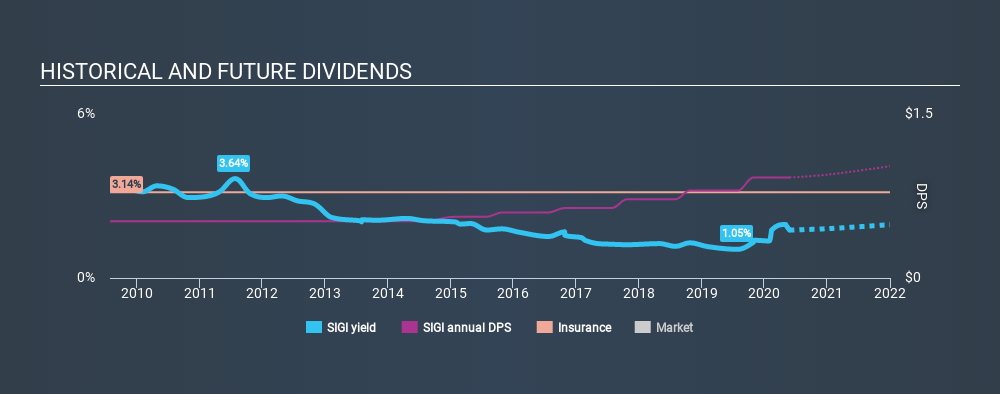- United States
- /
- Insurance
- /
- NasdaqGS:SIGI
Selective Insurance Group, Inc.'s (NASDAQ:SIGI) Attractive Combination: Does It Earn A Place In Your Dividend Portfolio?

Is Selective Insurance Group, Inc. (NASDAQ:SIGI) a good dividend stock? How can we tell? Dividend paying companies with growing earnings can be highly rewarding in the long term. Unfortunately, it's common for investors to be enticed in by the seemingly attractive yield, and lose money when the company has to cut its dividend payments.
While Selective Insurance Group's 1.8% dividend yield is not the highest, we think its lengthy payment history is quite interesting. Some simple research can reduce the risk of buying Selective Insurance Group for its dividend - read on to learn more.
Click the interactive chart for our full dividend analysis

Payout ratios
Dividends are typically paid from company earnings. If a company pays more in dividends than it earned, then the dividend might become unsustainable - hardly an ideal situation. Comparing dividend payments to a company's net profit after tax is a simple way of reality-checking whether a dividend is sustainable. Selective Insurance Group paid out 23% of its profit as dividends, over the trailing twelve month period. We'd say its dividends are thoroughly covered by earnings.
We update our data on Selective Insurance Group every 24 hours, so you can always get our latest analysis of its financial health, here.
Dividend Volatility
One of the major risks of relying on dividend income, is the potential for a company to struggle financially and cut its dividend. Not only is your income cut, but the value of your investment declines as well - nasty. Selective Insurance Group has been paying dividends for a long time, but for the purpose of this analysis, we only examine the past 10 years of payments. During this period the dividend has been stable, which could imply the business could have relatively consistent earnings power. During the past ten-year period, the first annual payment was US$0.52 in 2010, compared to US$0.92 last year. Dividends per share have grown at approximately 5.9% per year over this time.
Businesses that can grow their dividends at a decent rate and maintain a stable payout can generate substantial wealth for shareholders over the long term.
Dividend Growth Potential
While dividend payments have been relatively reliable, it would also be nice if earnings per share (EPS) were growing, as this is essential to maintaining the dividend's purchasing power over the long term. Earnings have grown at around 8.5% a year for the past five years, which is better than seeing them shrink! With a decent amount of growth and a low payout ratio, we think this bodes well for Selective Insurance Group's prospects of growing its dividend payments in the future.
Conclusion
Dividend investors should always want to know if a) a company's dividends are affordable, b) if there is a track record of consistent payments, and c) if the dividend is capable of growing. We're glad to see Selective Insurance Group has a low payout ratio, as this suggests earnings are being reinvested in the business. Next, growing earnings per share and steady dividend payments is a great combination. Selective Insurance Group fits all of our criteria, and we think it's an attractive dividend idea that would warrant further investigation.
Investors generally tend to favour companies with a consistent, stable dividend policy as opposed to those operating an irregular one. Meanwhile, despite the importance of dividend payments, they are not the only factors our readers should know when assessing a company. For instance, we've picked out 2 warning signs for Selective Insurance Group that investors should take into consideration.
Looking for more high-yielding dividend ideas? Try our curated list of dividend stocks with a yield above 3%.
Love or hate this article? Concerned about the content? Get in touch with us directly. Alternatively, email editorial-team@simplywallst.com.
This article by Simply Wall St is general in nature. It does not constitute a recommendation to buy or sell any stock, and does not take account of your objectives, or your financial situation. We aim to bring you long-term focused analysis driven by fundamental data. Note that our analysis may not factor in the latest price-sensitive company announcements or qualitative material. Simply Wall St has no position in any stocks mentioned. Thank you for reading.
About NasdaqGS:SIGI
Selective Insurance Group
Provides insurance products and services in the United States.
Excellent balance sheet established dividend payer.
Similar Companies
Market Insights
Community Narratives





